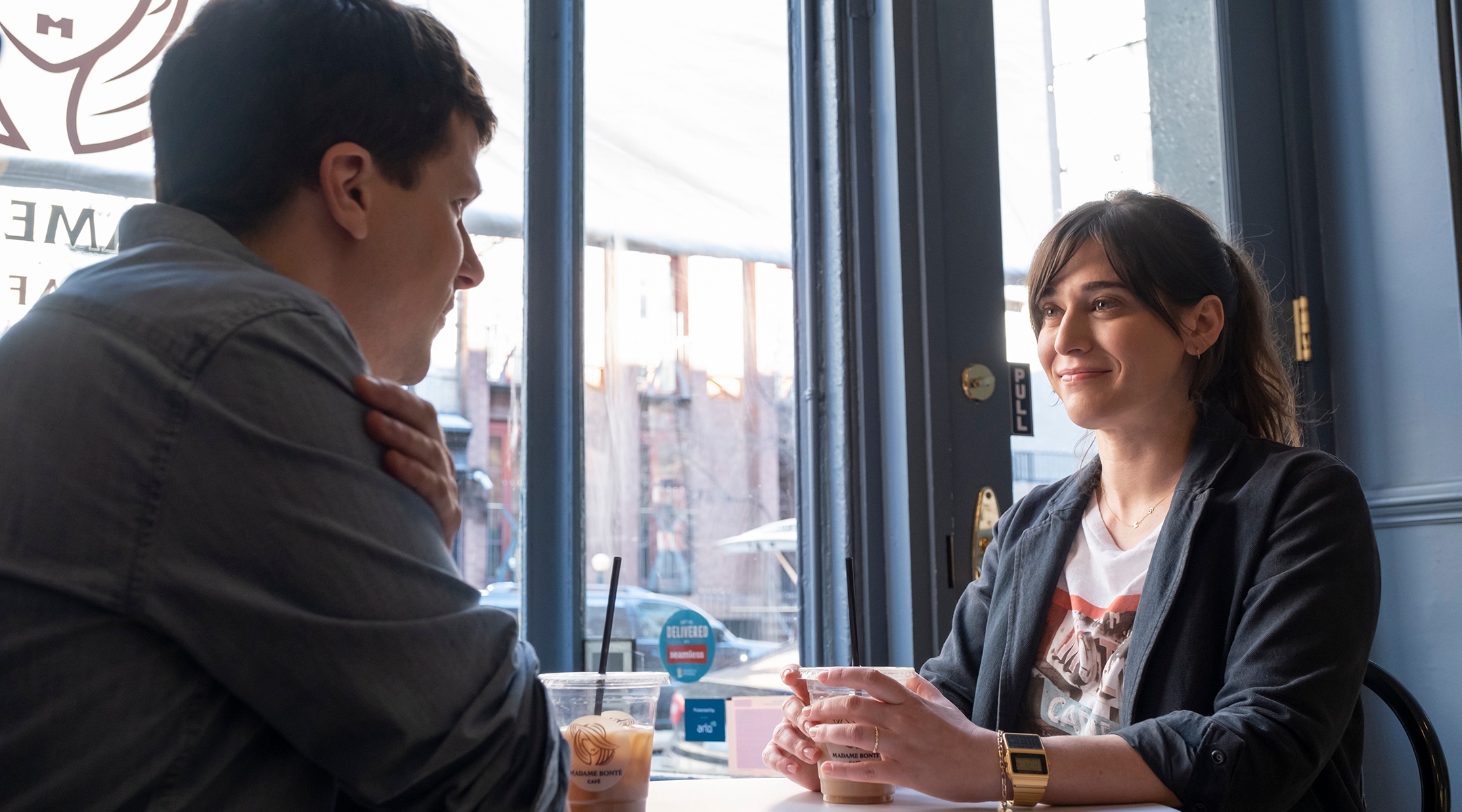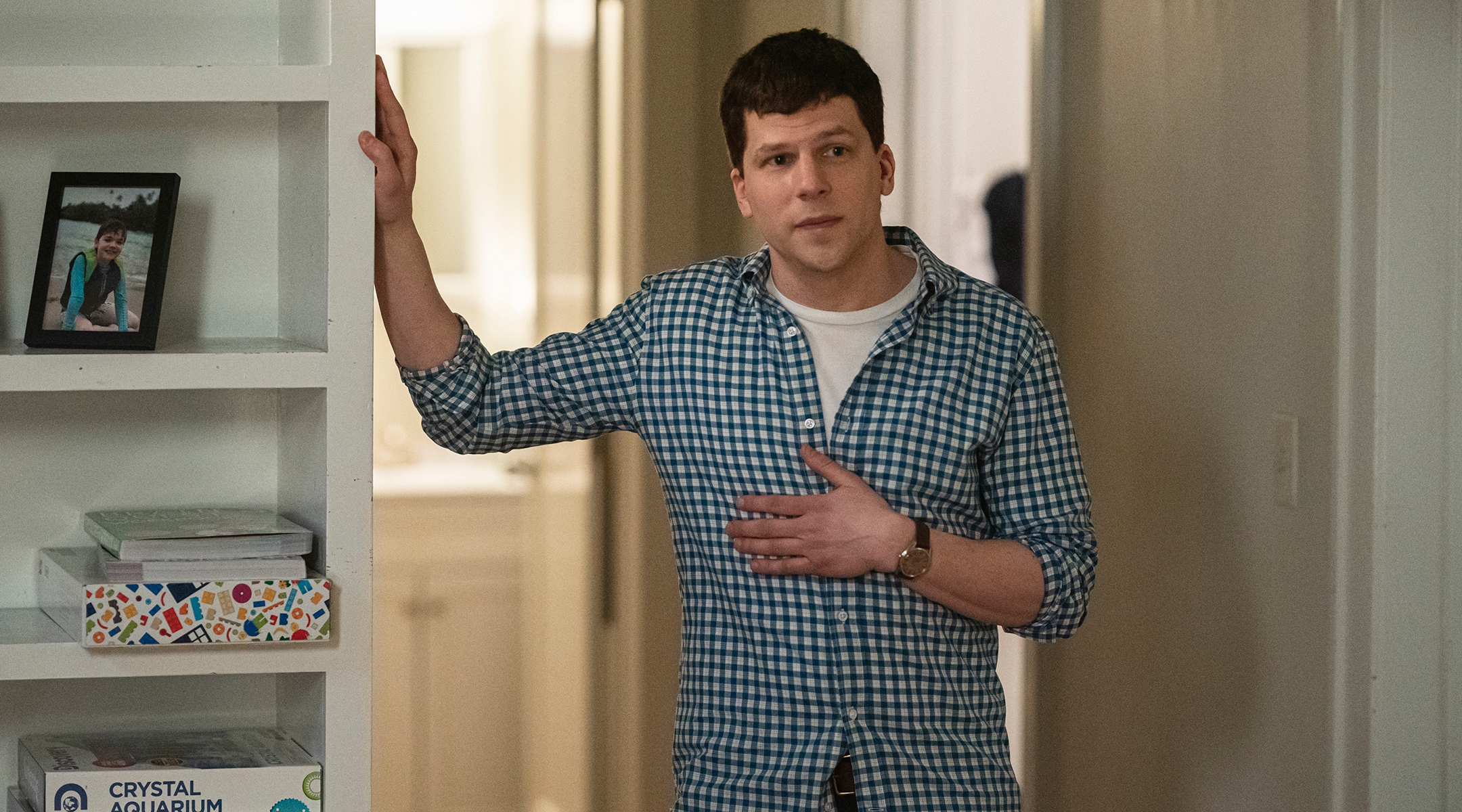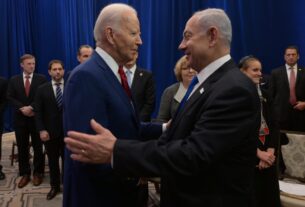(JTA) — From Taffy Brodesser-Akner’s point of view, her best-selling 2019 novel “Fleishman Is in Trouble” wasn’t all that Jewish. She’s a little perplexed by the deluge of press junket questions about its Jewish essence.
“It’s funny: I don’t think of it as a Jewish book. I know people do,” she said.
Brodesser-Akner, a journalist famous for her sharp celebrity profiles, is now the showrunner of the book’s star-studded TV adaptation, an 8-episode FX series that debuts on Hulu on Thursday. In the story, Toby Fleishman (played by Jesse Eisenberg) is a 41-year-old Jewish hepatologist who has recently divorced Rachel (Claire Danes), his ambitious, icy, blonde theater agent wife. Early on in the story, Rachel disappears in the middle of the night, leaving Toby with their two children and a truckload of resentment. Toby, who had a nebbishy and romantically insecure youth before marrying Rachel, is now drowning in the sexual bounty of dating apps.
On Zoom, Brodesser-Akner was speaking a few days after the show’s blowout bash at Carnegie Hall and Tavern on the Green, an iconic Central Park restaurant. “I’ve never been to an event like that. It was 600 people,” she said. It sounded like a scene that could have been plucked right from “Fleishman,” which is set on the extremely wealthy Upper East Side, and in which the responsibilities of marriage and parenthood are at odds with the ambitions and personal longings of its middle-aged characters.
Brodesser-Akner, 47, who was both adrenalized and a little frazzled, had to balance the premiere with parenting duties — she’s a mother of two boys, ages 15 and 12. “I’m still picking sequins from my teeth.”
As a writer, Brodesser-Akner likes to play with the power of subjectivity, and she built “Fleishman” on it. Though the story begins as Toby’s, it eventually morphs into a “Rashomon”-esque take on the divorce and what really went wrong in the Fleishmans’ marriage. The story is narrated by Libby (Lizzy Caplan), Toby’s friend from their year abroad in Israel. A former men’s magazine writer, Libby is now a lost and frustrated stay-at-home mom in suburban New Jersey (and a stand-in for Brodesser-Akner). Adam Brody steals scenes as Seth, an immature finance bro and another year-in-Israel friend with whom Toby reconnects after the divorce. (His presence is a homecoming of sorts for those of us who spent our tween years watching him play a different Seth in “The O.C.”)
“I don’t think of it as a Jewish book,” says Taffy Brodesser-Akner.
Brodesser-Akner pieced together the story’s Jewish elements: a doctor named Fleishman, a bat mitzvah, Friday night dinners, a year abroad in Israel, a few jokes about Jews being bad at home repairs (which is the subject of a very funny scene in episode six between Toby and Seth). There are a few insidery details that she fails to mention, like a fake Jewish sleepaway camp called Camp Marah, which sounds like the real Camp Ramah but roughly translates to “Camp Bitter” in Hebrew. Does all this add up to a “Jewish” story?
“I read ‘The Corrections’ by Jonathan Franzen, and it mentions Christmas I think 47 times. I read ‘Crossroads’ and it’s about the family of a youth minister. But neither of those is ever called a Christian book. This is called a Jewish book. I don’t object to it being called a Jewish book. But to me it’s mostly an American story. As a writer and as an observer of the culture, I think that calling this a Jewish book is proof of the answer to an old question: are Jews considered Americans? And the answer is no.” She threw in her characteristic meta analysis: “So now you have a very Jewish profile. How Jewish is that, Sarah?”
The self-aware comment is a good reminder that although her responses may be unguarded, she has not forgotten that she’s on the record. A name in New York media, Brodesser-Akner wrote for GQ and is now a staff writer for The New York Times Magazine, having profiled Gwyneth Paltrow, Ethan Hawke and Tom Hanks and written about the Joshua Cohen novel “The Netanyahus,” the television show “Thirtysomething” and much more. She inserts herself often into her writing, not to make it about herself, but to remind the reader that every profile is by nature filtered through the lens of the writer crafting it. Her writing is searing, self-deprecating — so raw it’s still bleeding and often quite funny.
“I wrote the book the way I would write a profile, just like I always do. But this man doesn’t exist,” she said.
RELATED: 5 Jewish places that inspired Taffy Brodesser-Akner’s ‘Fleishman Is in Trouble’
We had tried to meet in person near her home on the Upper West Side, but by the time she was available, I was in Tel Aviv, placing us along the Israel-New York axis on which “Fleishman” is set. When Toby suddenly calls Libby to tell her he’s getting divorced, he catapults her into memories of their early twenties in Jerusalem. Those thoughts make Libby miss the possibilities of her youth, the ones time has ruthlessly and inevitably extinguished. Eventually her longing for her past becomes so overwhelming that it threatens her marriage to her menschy and patient husband, played by Josh Radnor. (For more longing-for-younger-days while in Israel content, Brodesser-Akner wrote a Saveur essay about vegetable soup in Jerusalem — her Proustian madeleine. Interviewing Brodesser-Akner from my friend’s apartment in Tel Aviv, a city where I lived in my twenties, I found the theme of longing for the past hit almost too close to home.)
Part of the reason Brodesser-Akner doesn’t think the “Fleishman” story is all that Jewish is that she doesn’t feel all that Jewish — at least not relative to her mother and sisters, who are aligned with the Hasidic Chabad-Lubavitch movement and live within a few blocks of each other in Crown Heights, Brooklyn.
“I don’t think any writer has ever gotten it right,” she says of her Jewish background. “They say I was raised Orthodox. It’s interesting because it always makes me look like the black sheep in my family, when really they are. I’m exactly how I was raised to be until I was 12.”
After her mother, a secular Israeli, and her father, a Conservative Long Islander, divorced, her mother put Brodesser-Akner and her sisters in Jewish school. Some Jewish observance trickled back to her mother, who ended up going the Chabad route.
“My mom had never been inside a synagogue until the day she married my father. Now that is what we call ironic,” Brodesser-Akner said.
Brodesser-Akner’s two sisters followed, and her mother eventually remarried and had another child, the only sibling born into a religious household.
“The thing that made me a journalist was being raised in a home where, at age 12, I was relegated to observer. I had to learn how to understand other people’s points of view. And now that’s what I do,” she said.
Despite their religious differences — Brodesser-Akner attends an Orthodox synagogue but sends her children to an unaffiliated Jewish school and says she wakes up “every morning with new ideas” — the author is very close with her family, and her sisters were at the “Fleishman” premiere.
“They were at the premiere of my perverted sex show,” she joked with a laugh referring to the Hulu series, which features some sexual content as Toby explores the post-divorce New York dating scene. “They show up for me and I show up for them. I have my challenges with it, but I think their challenges must be greater. They never say this to me, but they must think that my life is comparatively…” She looked away thoughtfully, trying to find the right words. “They must think my lifestyle is comparatively less worthwhile. But we really love each other.”
To Brodesser-Akner, the most Jewish show on television is “The Patient,” which she calls “the best show I have seen in 100 years.” And that’s not because it (like “Fleishman”) is on FX. “I’m not that kind of interview!” she said.

Lizzy Caplan plays Toby’s friend Libby. (FX Networks)
“It’s the most Jewish show in all of the Jewish ways. It grapples with a Jewish prisoner; with the difference between a Conservative Jewish female cantor whose son becomes ultra-Orthodox — I’d never seen that on screen. It was kind of the only relatable Jewish matter I’ve ever seen. People ask me if I’ve watched ‘Shtisel.’ And I always say, I’m in the 47th season of an ultra-Orthodox family drama myself and not really interested!” She laughed. “But also I think of the other Jewish matters on television, which are adapted memoirs of people who were ultra-Orthodox and now aren’t. It’s like no one can imagine religious people being happy in their lives. And that’s really shocking to me. My family is very happy.”
Brodesser-Akner wound up with her dream cast: she had a list of five actors — Lizzy Caplan, Jesse Eisenberg, Claire Danes, Josh Radnor and Adam Brody — and no backup plan. She noted the fact that viewers have seen them grow up on screen as one reason they were right for the roles. For many, watching Caplan, Eisenberg and Brody sit across from each other in a diner will feel like a camp reunion, the fulfillment of a Jewish television fantasy they never knew they had.
“One thing that we were trying to get across is ‘how could it be that I am this old when I was once this young?’ And the fact that you have a memory of Claire from ‘My So-Called Life,’ or Jesse from ‘The Squid and the Whale’ — that does so much of the work of the show without writing a word,” Brodesser-Akner said.
Besides Danes (who plays the only main character with a non-Jewish parent, whom the book makes clear she resembles) the lead actors are all Jewish — a notable fact in a time when Jewish representation on screen, and who should be allowed to play Jewish characters, is the subject of continued debate.
Last month, New Yorker TV critic Emily Nussbaum, who is Jewish, tweeted, “There is a simple solution to the question of whether various non-Jewish actors are allowed to play Jews & that is to ask me.” Brodesser-Akner responded to the tweet, writing “[Non-Jew] Oscar Isaac in Scenes from a Marriage is the best ex-ortho I ever saw on screen!”
About casting Jewish actors, Brodesser-Akner noted a legal issue rarely mentioned in the representation debate: one can cast based on looks, but it’s illegal in the United States to cast based on religion. She took this very seriously.
“I spoke to [‘The Plot Against America’ director] David Simon about it and he said, ‘They’re actors. You let them act.’ And I agree with that. The question that I asked myself was who was perfect for it?” she said.
Even if Brodesser-Akner rejects the claim that “Fleishman” is a definitively Jewish story, wasn’t she consciously playing with some Philip Roth-inspired Jewish archetypes? Toby the nice Jewish doctor, the devoted, idealistic dad who’s also self-righteous, horny and insecure.
No, she insists she wasn’t. But also Philip Roth is so ingrained in her that who’s to say? And isn’t the question flawed in the first place?
“All I can say is that I am made out of Philip Roth. I’m so formed by his books. I actually would say that you have a bias in the asking of your question, in that you’re Jewish too. And you also are made out of Philip Roth books since you’re a writer. Again, that goes back to the same question as ‘are we American?’ To me, Toby is not ‘a Jewish guy.’ He’s just a guy! He’s the kind of guy I know! I was just trying to be myself.”
“Fleishman is in Trouble” premieres its first two episodes on Hulu on Nov. 17. It will release each of its six remaining episodes weekly on Thursdays.




